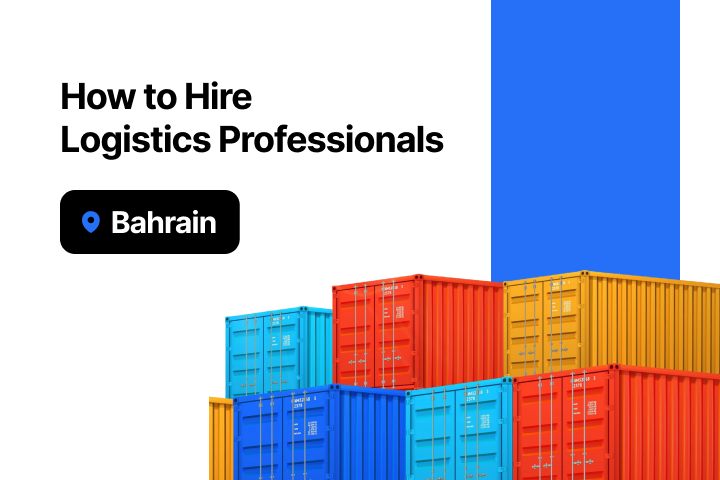The logistics industry in the UAE is vital to the country’s strategic economic vision, serving as a key hub between East and West and enabling global trade. As Dubai, Abu Dhabi, and other UAE cities rapidly expand their roles in transportation, warehousing, e-commerce, and supply chain management, the logistics sector's significance grows. In 2026, the sector is forecast to continue expanding driven by investments in infrastructure, digitization, and growing trade volumes.
With the ongoing growth in e-commerce, last-mile delivery, and advanced supply chain solutions, organizations are increasingly in need of skilled logistics professionals. This growing demand intensifies competition and makes effective logistics recruitment in the UAE a critical function for business success. Furthermore, talent shortages, evolving technology, and stringent legal requirements mean that companies must adapt their hiring strategies to stay competitive.
Hiring the right logistics professionals isn’t just about filling roles, it’s essential for maintaining a resilient, efficient, and innovative supply chain. In 2026, your organization’s ability to compete will depend on finding and retaining talent that can navigate complexities, foster cost-effective solutions, and leverage digital advances in logistics and supply chain management.
1. Overview of Logistics Hiring in UAE
The Demand for Logistics Professionals in UAE
The UAE remains at the forefront of logistics in the Middle East, with forecasts projecting sector growth exceeding 8% annually driven by increased global trade and the government’s strategic focus on logistics infrastructure. Dubai’s Expo legacy and Abu Dhabi’s port expansions seek to transform the country into a global logistics powerhouse.
This expansion is fueled by UAE’s rapidly growing e-commerce market, which is expected to reach $14 billion by 2026. Consequently, demand for logistics professionals is surging, particularly those who can optimize cross-border trade, enable digital logistics solutions, and manage complex supply chains. The rise in demand spans across transportation, distribution, inventory management, and last-mile delivery as UAE businesses accelerate their omni-channel models and digital transformation initiatives.
As automation, AI, and real-time supply chain monitoring become standard, companies are seeking talent to leverage these innovations for competitive advantage. Firms are increasingly competing with international players for skilled professionals adept in both traditional logistics and modern supply chain management.
Explore UAE HR Trends Guide.
Key Roles in Demand
Key logistics positions currently facing high demand in the UAE include:
- Supply Chain Managers
- Logistics Coordinators
- Warehouse Supervisors
- Transportation Managers
- Inventory Controllers
- Procurement and Distribution Specialists
- Customs and Compliance Officers
Warehouse and logistics coordinator roles often see the highest volume of openings, especially with the growth in e-commerce and 3PL firms. At the same time, leadership positions such as supply chain managers, who bring advanced digital skills and international experience, are among the hardest to fill due to intense competition and skill shortages.
For a detailed look at logistics manager expectations, review commonly asked interview questions for logistics managers.
2. Qualifications and Skills Needed for Logistics Professionals in UAE
Required Certifications and Education
Employers in the UAE generally require candidates to possess a bachelor’s degree in logistics, supply chain management, business administration, or industrial engineering. For mid-to-senior roles, a master’s degree or MBA with a logistics or operations focus is increasingly preferred.
- APICS Certified Supply Chain Professional (CSCP)
- Six Sigma Certification (Yellow, Green, or Black Belt)
- Certified in Logistics, Transportation, and Distribution (CLTD)
- Project Management Professional (PMP) is valued for complex supply chain projects
Technical training on warehouse management systems, transport management solutions, and lean logistics also stand out in competitive candidate profiles. UAE companies are prioritizing candidates with specialized certifications that align with international best practices.
Essential Skills for 2026
The ideal logistics professional in the UAE combines robust technical acumen with critical soft skills:
- Technical Proficiency:
SAP, Oracle, or other ERP expertise; hands-on experience with warehouse management systems (WMS) and RFID technology.
- Data Analytics:
Ability to leverage data for demand forecasting, route optimization, and efficiency improvement.
- Automation and AI:
Familiarity with automated sorting, robots, or AI-based supply chain platforms.
- Soft Skills:
Strong problem-solving, adaptable to digital disruptions, effective communication, cross-functional teamwork, and cultural fluency.
- Process Optimization:
Knowledge of Lean or Six Sigma methodologies to reduce costs and improve operations.
As the logistics industry in UAE digitizes and automates further, candidates who can harness AI, predictive analytics, and smart warehousing will be especially valuable.
3. Recruitment Challenges in Hiring Logistics Professionals
Key Challenges in UAE
Despite strong demand, several recruitment challenges persist for logistics employers in the UAE:
- Technical skill shortages:
Especially in automation, AI, and advanced analytics.
- Stiff competition:
Multinational corporations with regional headquarters in the UAE often bid aggressively for top local and expat talent.
- Workforce diversity and regulation:
Balancing Emiratisation requirements and workforce localization with the need for specialized skills.
- Retention difficulties:
High turnover rates spurred by strong market demand and limited supply of senior logistics professionals.
To learn how UAE employers can address demographic and skills supply concerns, the UAE Labor Market Demographics Guide provides key facts.
Addressing Turnover and Retention
To build a stable logistics workforce, companies in the UAE are implementing several retention strategies:
- Providing clear career progression with visible paths to management
- Investing in on-site and digital training programs, from WMS to export compliance
- Offering competitive salary packages indexed to performance and cost of living changes
- Fostering positive culture and regular recognition through employee engagement initiatives
Salary benchmarking and continuous development opportunities are proven to reduce attrition. For innovative retention methods, read about creating a culture of recognition in the UAE.
4. Effective Hiring Channels for Logistics Roles in UAE
Top Job Platforms and Networks
For effective logistics recruitment in UAE, organizations should use leading online job boards, niche platforms, and trusted recruitment agencies. Key options include:
- Bayt, Naukri Gulf, and LinkedIn for broad reach and active logistics communities
- UAE recruitment agencies with dedicated logistics specialists
- Top job platforms in the UAE for targeted sourcing
- Qureos for industry-specific screening and access to pre-vetted logistics talent
Platforms specializing in warehousing, supply chain, and transportation roles streamline the shortlisting process, ensuring higher matching accuracy between employers and candidates.
Utilizing Industry-Specific Networks
Professional associations and industry groups are essential for finding logistics professionals in the UAE. In particular, organizations such as the Chartered Institute of Logistics and Transport (CILT), local chapters of the Supply Chain & Logistics Group (SCLG), and special interest councils within Dubai Chamber facilitate networking events and knowledge sharing.
Attending forums, workshops, and conferences also supports brand building among logistics professionals eager for career development and industry updates. Engagement in such networks often uncovers passive candidates and referrals with niche expertise.
5. Salary and Benefits for Logistics Professionals in UAE
Salary Expectations in UAE
Salary ranges in UAE logistics roles depend on position, experience level, and sector specialization:
- Entry-level logistics coordinators typically earn between AED 6,000 – 10,000 per month.
- Warehouse supervisors average AED 8,000 – 15,000 monthly.
- Supply chain managers command salaries ranging from AED 18,000 up to AED 35,000 or higher, with bonuses for high performers.
Factors such as years of experience, technical upskilling, and industry segment (FMCG, retail, shipping) significantly impact individual compensation. For comprehensive benchmarks, check the UAE compensation and benefits trends guide.
Typical Benefits Offered
UAE employers recognize that competitive benefits are crucial for logistics talent attraction and retention. Standard offerings include:
- Comprehensive private healthcare coverage
- Annual airfare allowances or relocation grants
- Performance-based bonuses and sales incentives
- End-of-service gratuity (as per UAE labor law)
- Retirement plan contributions
- Generous paid leave, including annual, sick, and special leave
- Professional development funding for upskilling and certification fees
Flexible work arrangements and wellness programs are increasingly common as companies compete for top logistics candidates in the UAE market.
6. Legal Considerations for Hiring Logistics Professionals in UAE
Labor Laws Impacting Logistics Recruitment
Employers must comply with UAE labor laws, which govern work hours (maximum 8 hours/day, 48 hours/week), mandatory breaks, overtime pay, and public holidays. Employment contracts must clearly state role responsibilities, salary, probationary periods, and termination terms. Employees are entitled to annual leave, end-of-service benefits, and workplace injury compensation.
For legal compliance when hiring logistics professionals, see the latest guidelines for employment contracts, records, and wages in the UAE.
Work Permits and Visas for Foreign Talent
The UAE continues to rely on expatriate logistics talent, making an understanding of permit processes essential. Employers must sponsor employment visas and labor permits for foreign professionals, a process encompassing medical fitness, background checks, and attestation of academic qualifications.
Renewals, role transfers, and compliance with Emiratisation targets are regulated by the Ministry of Human Resources and Emiratisation (MOHRE). Fast-track options are available for select skilled professions. For a step-by-step overview, visit the UAE work permit guide for employers.
7. Conclusion
Logistics recruitment in the UAE demands a strategic, forward-looking approach in 2026. As the sector expands with new infrastructure, digital adoption, and global trade growth, finding and retaining logistics talent is paramount. Employers should focus on upskilling, offering attractive benefits, and using robust screening across specialized and digital channels. Navigating local regulations and leveraging strong employer branding will ensure logistics professionals choose your organization.
By understanding demand dynamics, hiring requirements, salary trends, and legal considerations, employers can secure top logistics talent sustaining competitive advantage in a dynamic UAE logistics marketplace. Staying flexible to industry change and investing in professional development are key to long-term recruitment success.
{{tool-uae="/sandbox/home-v3"}}
FAQs on How to Hire Logistics Professionals in UAE
What are the best recruitment platforms for logistics professionals in UAE?
Leading platforms include Bayt, Naukrigulf, and LinkedIn. For targeted searches, logistics-focused UAE recruitment agencies and Qureos offer access to pre-screened logistics candidates and industry-specific hiring solutions.
How to hire logistics professionals in 2026?
Assess your skill gaps, create compelling job descriptions, leverage digital job boards and industry-specific networks, and use structured interviews to identify both technical and soft skills. Offer competitive salary packages and clear career growth to attract and retain top talent.
Which skills are essential for logistics professionals in UAE?
Key skills include ERP (SAP, Oracle), warehouse management systems, automation technology, data analytics, cross-functional teamwork, strong communication, and process optimization skills such as Lean or Six Sigma methodologies.
What qualifications are required for logistics roles in UAE?
Candidates generally need a bachelor’s degree in logistics or supply chain management. Certifications like APICS CSCP, Six Sigma, CLTD, and PMP enhance employability for mid-to-senior roles. Technical and software training is highly valued.
How to retain top logistics talent in UAE?
Offer career advancement paths, ongoing training opportunities, competitive benefits, a supportive work culture, and recognition programs. Benchmark pay and provide leadership development to reduce turnover and improve workforce stability.
What are the salary expectations for logistics professionals in UAE?
Entry-level logistics coordinators earn AED 6,000 to 10,000 per month, while supply chain managers can earn from AED 18,000 up to AED 35,000 monthly. Salary varies based on experience, specialization, and industry sector.
What are the top challenges in logistics recruitment in UAE?
Major challenges include technical skill shortages, high competition from global companies, balancing Emiratisation policies, and workforce retention particularly at managerial and specialist levels in logistics and supply chain roles.
Which job platforms specialize in logistics recruitment?
Niche logistics recruitment is carried out on platforms like Qureos, local UAE recruitment agencies, and select job boards filtering by logistics, warehousing, and supply chain roles to ensure accurate matches and industry expertise.
What benefits should logistics employers offer to attract talent in UAE?
Standard benefits include private healthcare, annual airfare, end-of-service gratuity, annual leave, bonuses, and retirement plan contributions. Increasingly, companies offer wellness programs and flexible work options to attract in-demand professionals.
What are the legal requirements for hiring foreign logistics professionals in UAE?
Employers must secure UAE work visas and permits, sponsor employee residency, and comply with MOHRE regulations. Employment contracts must specify roles, pay, and termination terms while adhering to labor laws on hours and benefits.




